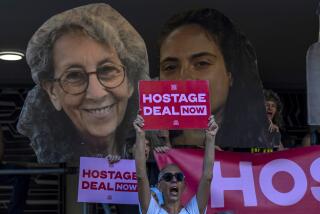Paramilitary in Colombia Vows to Hold Its Fire
BOGOTA, Colombia — This nation’s right-wing paramilitary forces announced a unilateral cease-fire Friday, boosting hopes for peace in a country blasted by violence.
The fighters pledged to begin the cease-fire, which was reported by sources earlier in the week, on Sunday. But they reserved the right to respond “in legitimate defense” if they were attacked by leftist rebels, their sworn enemy.
The declaration by the United Self-Defense Forces of Colombia, or AUC for their initials in Spanish, also said the group was willing to immediately begin peace talks with the government toward permanent disarmament.
“With a patriotic and civil spirit, and as an explicit demonstration of our constant desire for peace in this country, the United Self-Defense Forces have made the historic decision to declare a unilateral cease-fire, with national reach, without renouncing our principals or ideals,” read the statement, signed by 30 paramilitary commanders, including the group’s leader, Carlos Castano.
President Alvaro Uribe did not immediately respond to the offer, the first time the paramilitary forces have indicated a willingness to negotiate without a parallel cease-fire by the guerrillas.
Peace groups and human rights organizations welcomed the news but said questions surrounded the larger issue of negotiations with a group that has been responsible for the majority of massacres in Colombia’s conflict in recent years.
“It’s obviously a very important and positive development,” said Jose Miguel Vivanco, head of the Americas division of New York-based Human Rights Watch. “My only concern is, what’s the price?”
Friday’s announcement was widely expected after Uribe confirmed this week that his government had begun secret talks with the right-wing forces with the help of Roman Catholic Church officials.
Colombia’s nearly 4-decade-old conflict pits leftist rebels against the government and the AUC, a violent illegal army. Human rights organizations have long accused the military and the paramilitary groups of working together against their common enemy, the guerrillas.
A peace deal with the AUC would be an astounding achievement for Uribe’s government, which has stepped up military activity against the rebels as well as the right-wing fighters.
Peace talks under the previous government with the country’s largest rebel group, the Revolutionary Armed Forces of Colombia, or FARC, broke down in February after three years of fruitless negotiations.
The Uribe government also has been negotiating in Cuba with a smaller rebel group, the National Liberation Army, which has been greatly weakened by attacks from paramilitary fighters in recent years.
Doubts exist about whether the paramilitary cease-fire would last, especially since the guerrillas have made no promise to stop attacks against right-wing forces. Both groups have occasionally announced temporary cease-fires around Christmas, and hostilities later resumed.
The two groups battle for control of territory for the transit of arms and drugs, which both sides rely on for financing. The paramilitary forces control huge areas of rural Colombia where there is little government presence, as well as urban areas where they work in conjunction with local police.
Analysts said the AUC is engaging in a savvy political strategy that would allow it to blame the guerrillas for continued violence.
“The Achilles’ heel here is the FARC, who are going to try to recuperate territory,” said Fernando Cepeda, a political analyst. “The paramilitaries will then be able to say, ‘We are responding to being attacked,’ and cast responsibility for the war to the FARC” and other groups.
Even more contentious was the issue of peace talks with the paramilitary forces, a series of private armies united in a loose confederation totaling about 11,000 fighters. At least three smaller paramilitary groups did not join in Friday’s declaration.
The 12-point AUC declaration imposes a series of conditions for talks to begin. It invites the participation of not only the government but also the Catholic church, the United Nations and the Organization of American States.
The AUC called for political recognition by the government, a move that would give it the legal status necessary to begin talks that could lead to a possible amnesty for its members.
Next, it demanded the release of imprisoned fighters. About 1,000 are estimated to be held on a variety of charges, including drug trafficking, torture and massacre.
The group also insisted that the government provide its fighters financial support while talks proceed.
The paramilitary fighters finance themselves through donations from large landowners and businessmen and from proceeds from drug dealing.
The final and most controversial demand, however, is that Colombian officials drop any arrest warrants against members of the paramilitary negotiating team -- almost sure to include Castano, military commander Salvatore Mancuso and perhaps finance officer Juan Carlos Sierra.
The men have dozens of warrants against them, including torture and massacre.
The last point was likely to be met with strong resistance from both the U.S. and rights groups.
All three men were indicted by the U.S. attorney general’s office in September for allegedly shipping more than 15 tons of cocaine into the U.S. during the last several years. Also, the State Department has declared the AUC a terrorist organization.
An American official said the U.S. would be unable to extradite Castano if Colombian authorities did not first arrest him.
And rights groups made it clear they would not accept a pardon for Castano or others accused of crimes against humanity.
“There cannot be impunity,” said Ana Teresa Bernal, the director of Redepaz, the country’s largest peace organization. “There have been so many victims left behind by this group.”
*
Special correspondents Ruth Morris and Mauricio Hoyos contributed to this report.
More to Read
Sign up for Essential California
The most important California stories and recommendations in your inbox every morning.
You may occasionally receive promotional content from the Los Angeles Times.










